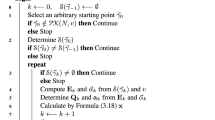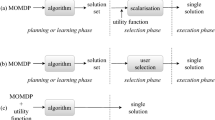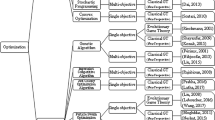Abstract
We introduce Transformation Games (TGs), a form of coalitional game in which players are endowed with sets of initial resources, and have capabilities allowing them to derive certain output resources, given certain input resources. The aim of a TG is to generate a particular target resource; players achieve this by forming a coalition capable of performing a sequence of transformations from a combined set of initial resources to the target resource. TGs can model a number of natural settings, such as cooperative proof systems, where a collection of agents having different expertise work together to derive a proof for a target theorem, or supply chains, where agents cooperate to create a target product from base resources. After presenting the TG model, and discussing its interpretation, we consider possible restrictions on the transformation chain, resulting in different coalitional games. Following the basic model, we consider the computational complexity of several problems in TGs, such as testing whether a coalition wins, checking if a player is a dummy or a veto player, computing the core of the game, computing power indices, and checking the effects of possible restrictions on the coalition. Finally, we consider extensions to the model in which transformations have associated costs.
Similar content being viewed by others
References
Aumann, R.J., Hart, S. (eds.): Handbook of Game Theory, with Economic Applications, vol. 2. North-Holland, Amsterdam (1994)
Aziz, H., Bachrach, Y., Elkind, E., Paterson, M.: False-name manipulations in weighted voting games. J. Artif. Intell. Res. 40(1), 57–93 (2011)
Aziz, H., Lachish, O., Paterson, M., Savani, R.: Power indices in spanning connectivity games. In: Algorithmic Aspects in Information and Management, pp. 55–67 (2009)
Aziz, H., Paterson, M.: False name manipulations in weighted voting games: splitting, merging and annexation. In: Proceedings of the 8th International Conference on Autonomous Agents and Multiagent Systems, pp. 409–416. International Foundation for Autonomous Agents and Multiagent Systems (2009)
Babaioff, M., Walsh, W.E.: Incentive-Compatible, Budget-Balanced, yet Highly Efficient Auctions for Supply Chain Formation. Decision Support Systems (2005)
Bachrach, Y.: Honor among thieves: collusion in multi-unit auctions. In: Proceedings of the 9th International Conference on Autonomous Agents and Multiagent Systems, pp. 617–624. International Foundation for Autonomous Agents and Multiagent Systems (2010)
Bachrach, Y.: The least-core of threshold network flow games. Math. Found. Comput. Sci. 1, 36–47 (2011)
Bachrach, Y., Elkind, E.: Divide and conquer: false-name manipulations in weighted voting games. In: Proceedings of the 7th International Joint Conference on Autonomous Agents and Multiagent Systems, pp. 975–982. International Foundation for Autonomous Agents and Multiagent Systems (2008)
Bachrach, Y., Elkind, E., Faliszewski, P.: Coalitional voting manipulation: a game-theoretic perspective. In: The 22nd International Joint Conference on Artificial Intelligence (IJCAI 2011), pp. 49–54 (2011)
Bachrach, Y., Elkind, E., Meir, R., Pasechnik, D., Zuckerman, M., Rothe, J., Rosenschein, J.S.: The cost of stability in coalitional games. In: Algorithmic Game Theory, pp. 122–134 (2009)
Bachrach, Y., Kash, I., Shah, N.: Agent failures in totally balanced games and convex games. In: Proceedings of the 8th Workshop on Internet and Network Economics (2012)
Bachrach Y., Key, P., Zadimoghaddam, M.: Collusion in VCG path procurement auctions. In: Internet and Network Economics, pp. 38–49 (2010)
Bachrach, Y., Markakis, E., Resnick, E., Procaccia, A.D., Rosenschein, J.S., Saberi, A.: Approximating power indices: theoretical and empirical analysis. Journal of Autonomous Agents and Multi-Agent Systems 20(2), 105–122 (2010)
Bachrach, Y., Meir, R., Feldman, M., Tennenholtz, M.: Solving cooperative reliability games. UAI (2011)
Bachrach, Y., Meir, R., Jung, K., Kohli, P.: Coalitional structure generation in skill games. In: Proceedings of the 24th Conference on Artificial Intelligence (AAAI-2010) (2010)
Bachrach, Y., Meir, R., Zuckerman, M., Rothe, J., Rosenschein, J.S.: The cost of stability in weighted voting games. In: Proceedings of the 8th International Conference on Autonomous Agents and Multiagent Systems, pp. 1289–1290. International Foundation for Autonomous Agents and Multiagent Systems (2009)
Bachrach, Y., Porat, E.: Path disruption games. In: Proceedings of the 9th International Conference on Autonomous Agents and Multiagent Systems, pp. 1123–1130. International Foundation for Autonomous Agents and Multiagent Systems (2010)
Bachrach, Y., Rosenschein, J.S.: Coalitional skill games. In: AAMAS-08 (2008)
Bachrach, Y., Rosenschein, J.S.: Power in threshold network flow games. Journal of Autonomous Agents and Multi-Agent Systems 18(1), 106–132 (2009)
Bachrach, Y., Rosenschein, J.S., Porat, E.: Power and stability in connectivity games. In: AAMAS-08 (2008)
Bachrach, Y., Zuckerman, M., Wooldridge, M., Rosenschein, J.S.: Proof systems and transformation games. Math. Found. Comput. Sci. 1, 78–89 (2010)
Banzhaf, J.F.: Weighted voting doesn’t work: a mathematical analysis. Rutgers Law Rev. 19, 317–343 (1965)
Cerquides, J., Endriss, U., Giovannucci, A., Rodríguez-Aguilar, J.A.: Bidding languages and winner determination for mixed multi-unit combinatorial auctions. Institute for Logic, Language and Computation (ILLC), University of Amsterdam (2006)
Chakrabarti, A., de Alfaro, L., Henzinger, T.A., Stoelinga, M.: Resource interfaces. In: Proceedings of the 3rd International Conference on Embedded Software (EMSOFT) (LNCS vol. 2855), pp. 117–133. Springer-Verlag, Berlin, Germany (2003)
Chalkiadakis, G., Elkind, E., Wooldridge, M.: Computational Aspects of Cooperative Game Theory. Morgan & Claypool (2011)
Chen, R., Roundy, R., Zhang, R., Janakiraman, G.: Efficient auction mechanisms for supply chain procurement. Manage. Sci. 51(3), 467–482 (2005)
Conitzer, V., Sandholm, T.: Computing Shapley values, manipulating value division schemes, and checking core membership in multi-issue domains. In: Proc. of AAAI-04 (2004)
Conitzer, V., Sandholm, T.: Complexity of determining nonemptiness of the core. In: Proceedings ACM EC-03, pp. 230–231 (2003)
Cormen, T.H.: Introduction to Algorithms. The MIT Press (2001)
de Kok, A.G., Graves, S.C.: Information sharing and supply chain coordination. In: Supply Chain Management: Design, Coordination and Operation, p. 341 (2003)
Deng, X., Papadimitriou, C.H.: On the complexity of cooperative solution concepts. Math. Oper. Res. 19(2), 257–266 (1994)
Denzinger, J., Kronenburg, M.: Planning for distributed theorem proving. In: Proc. KI-96 (LNAI vol. 1137), pp. 43–56 (1996)
Dinar, A., Ratner, A., Yaron, D.: Evaluating cooperative game theory in water resources. Theory Decis. 32(1), 1–20 (1992)
Downey, R.G., Fellows, M.R., Victoria University of Wellington. Mathematics Dept.: Fixed-parameter tractability and completeness I: basic results. SIAM J. Comput. 24(4), 873–921 (1995)
Dunne, P.E., van der Hoek, W., Kraus, S., Wooldridge, M.: Cooperative boolean games. In: Proceedings of the 7th International Joint Conference on Autonomous Agents and Multiagent Systems, pp. 1015–1022. International Foundation for Autonomous Agents and Multiagent Systems (2008)
Elkind, E., Goldberg, L., Goldberg, P., Wooldridge, M.: Computational complexity of weighted threshold games. In: AAAI-2007 (2007)
Engel, Y., Brafman, R., Domshlak, C., Tennenholtz, M.: Planning games. In: Proceedings of the 21st International Joint Conference on Artificial Intelligence (2009)
Ephrati, E., Pollack, M.E., Rosenschein, J.S.: A tractable heuristic that maximizes global utility through local plan combination. In: The 1st International Conference on Multiagent Systems, pp. 94–101. San Francisco, California (1995)
Ephrati, E., Rosenschein, J.S.: A heuristic technique for multiagent planning. Ann. Math. Artif. Intell. 20, 13–67. Spring (1997)
Faliszewski, P., Hemaspaandra, L.: The complexity of power-index comparison. In: Algorithmic Aspects in Information and Management, pp. 177–187 (2008)
Fisher, M., Wooldridge, M.: Distributed problem-solving as concurrent theorem proving. In: Multi-Agent Rationality MAAMAW-97. Springer-Verlag, Berlin, Germany (1997)
Gabarro, J., Garcia, A., Clint, M., Kilpatrick, P., Stewart, A.: Bounded site failures: an approach to unreliable grid environments. In: Making Grids Work, pp. 175–187 (2008)
Garey, M.R., Johnson, D.S.: Computers and Intractability: A Guide to the Theory of NP-Completeness. W. H. Freeman and Company (1979)
Genesereth, M.R., Nilsson, N.: Logical Foundations of Artificial Intelligence. Morgan Kaufmann Publishers, San Mateo, CA (1987)
Ghallab, M., Nau, D., Traverso, P.: Automated Planning: Theory and Practice. Morgan Kaufmann Publishers, San Mateo, CA (2004)
Gillies, D.B.: Some theorems on n-person games. PhD thesis, Princeton University (1953)
Giovannucci, A., Rodriguez-Aguilar, J.A., Cerquides, J., Endriss, U.: Winner determination for mixed multi-unit combinatorial auctions via petri nets. In: Proceedings of the 6th International Joint Conference on Autonomous Agents and Multiagent Systems, p. 104. ACM (2007)
Giovannucci, A., Rodriguez-Aguilar, J.A., Vinyals, M., Cerquides, J., Endriss, U.: Mixed multi-unit combinatorial auctions for supply chain management. ACM SIGecom Exchanges 7(1), 58–60 (2007)
Giovannucci, A., Vinyals, M., Rodriguez-Aguilar, J.A., Cerquides, J.: Computationally-efficient winner determination for mixed multi-unit combinatorial auctions. In: Proceedings of the 7th International Joint Conference on Autonomous Agents and Multiagent Systems, pp. 1071–1078. International Foundation for Autonomous Agents and Multiagent Systems (2008)
Girard, J.-Y.: Linear logic. Theor. Comp. Sci. 50(1), 1–102 (1987)
Granot, D., Huberman, G.: Minimum cost spanning tree games. Math. Program. 21(1), 1–18 (1981)
Harrenstein, P., van der Hoek, W., Meyer, J.J., Witteveen, C.: Boolean games. In: Proceedings of the 8th Conference on Theoretical Aspects of Rationality and Knowledge, pp. 287–298. Morgan Kaufmann Publishers Inc. (2001)
Lenat, D.B.: BEINGS: knowledge as interacting experts. In: IJCAI-75, pp. 126–133 (1975)
Li, L., Zhang, H.: Confidentiality and information sharing in supply chain coordination. Manage. Sci. 54(8), 1467–1481 (2008)
Matsui, Y., Matsui, T.: NP-completeness for calculating power indices of weighted majority games. Theor. Comp. Sci. 263(1–2), 305–310 (2001)
Meir, R., Bachrach, Y., Rosenschein, J.: Minimal subsidies in expense sharing games. In: Algorithmic Game Theory, pp. 347–358 (2010)
Meir, R., Rosenschein, J.S., Malizia, E.: Subsidies, stability, and restricted cooperation in coalitional games. In: Proc. of 22nd IJCAI (2011)
Meir, R., Tennenholtz, M., Bachrach, Y., Key, P.: Congestion games with agent failures. In: 26th AAAI Conference on Artificial Intelligence (2012)
Osborne, M.J., Rubinstein, A.: A Course in Game Theory. MIT Press (1994)
Ostrovsky, M.: Stability in supply chain networks. Am. Econ. Rev. 98(3), 897–923 (2008)
Owen, G.: Multilinear extensions and the Banzhaf Value. Nav. Res. Logist. Q. 22(4), 741–750 (1975)
Peleg, B., Sudholter, P.: Introduction to the Theory of Cooperative Games, 2nd edn. Springer-Verlag, Berlin, Germany (2002)
Penn, M., Polukarov, M., Tennenholtz, M.: Congestion games with failures. In: Proceedings of the 6th ACM Conference on Electronic Commerce, pp. 259–268. ACM (2005)
Penn, M., Polukarov, M., Tennenholtz, M.: Congestion games with load-dependent failures: identical resources. Games. Econom. Behav. 67(1), 156–173 (2009)
Qiu, L.D., Tao, Z.: Policy on international r&d cooperation: subsidy or tax? Eur. Econ. Rev. 42(9), 1727–1750 (1998)
Resnick, E., Bachrach, Y., Meir, R., Rosenschein, J.: The cost of stability in network flow games. Math. Found. Comput. Sci. 1, 636–650 (2009)
Schmeidler, D.: The nucleolus of a characteristic function game. SIAM J. Appl. Math. 17(6), 1163–1170 (1969)
Shapley, L.S.: A value for n-person games. In: Contrib. to the Theory of Games, pp. 31–40 (1953)
Shapley, L.S., Shubik, M.: A method for evaluating the distribution of power in a committee system. Am. Polit. Sci. Rev. 48, 787–792 (1954)
Sheu, J.B., Chou, Y.H., Hu, C.C.: An integrated logistics operational model for green-supply chain management. Transp. Res., Part E Logist. Trans. Rev. 41(4), 287–313 (2005)
Shoham, Y., Leyton-Brown, K.: Multiagent Systems: Algorithmic, Game-Theoretic, and Logical Foundations. Cambridge University Press, Cambridge, England (2008)
Shrot, T., Aumann, Y., Kraus, S.: On agent types in coalition formation problems. In: Proceedings of the 9th International Conference on Autonomous Agents and Multiagent Systems, pp. 757–764. International Foundation for Autonomous Agents and Multiagent Systems (2010)
Simatupang, T.M., Wright, A.C., Sridharan, R.: The knowledge of coordination for supply chain integration. Bus. Process. Manag. J. 8(3), 289–308 (2002)
Vadhan, S.P.: The complexity of counting in sparse, regular, and planar graphs. SIAM J. Comput. 31(2), 398–427 (2002)
Voorneveld, M., Grahn, S.: Cost allocation in shortest path games. Math. Method Oper. Res. 56(2), 323–340 (2002)
Wagman, L., Conitzer, V.: Optimal false-name-proof voting rules with costly voting. In: Proceedings of the National Conference on Artificial Intelligence (AAAI), pp. 190–195 (2008)
Wooldridge, M., Dunne, P.E.: On the computational complexity of coalitional resource games. Artif. Intell. 170(10), 853–871 (2006)
Yokoo, M., Conitzer, V., Sandholm, T., Ohta, N., Iwasaki, A.: Coalitional games in open anonymous environments. In: IJCAI-05 (2005)
Zuckerman, M., Faliszewski, P., Bachrach, Y., Elkind, E.: Manipulating the quota in weighted voting games. In: The 23rd National Conference on Artificial Intelligence (AAAI-2008) (2008)
Zuckerman, M., Faliszewski, P., Conitzer, V., Rosenschein, J.: An NTU cooperative game theoretic view of manipulating elections. In: Internet and Network Economics, pp. 363–374 (2011)
Author information
Authors and Affiliations
Corresponding author
Additional information
This is an extended version of a conference paper with the same title [21], which was presented at the 35th International Symposium on Mathematical Foundations of Computer Science (MFCS 2010), in Brno, Czech Republic. This new version contains additional results regarding computing the Shapley value in Transformation Games as well as additional results on Transformation Games with a bounded number of resources and transformations. We have also expanded our examination of how the Transformation Game model can capture multiagent interactions in both supply chains and proof systems, and included revised and extended proofs.
Rights and permissions
About this article
Cite this article
Bachrach, Y., Zuckerman, M., Wooldridge, M. et al. Proof systems and transformation games. Ann Math Artif Intell 67, 1–30 (2013). https://doi.org/10.1007/s10472-012-9323-9
Published:
Issue Date:
DOI: https://doi.org/10.1007/s10472-012-9323-9




